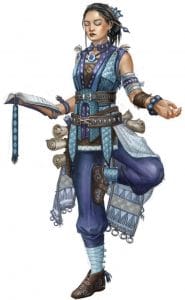Dungeon Masters spend a lot of time making D&D 5e NPCs.
It’s fun to imagine character backstories and mannerisms, then stat them out, creating a full formed NPC. But the reality is that most NPCs never even draw a sword, yet hours of time was spent fiddling with their stat blocks!
Monsters in D&D have quite a bit of crunch to them which is necessary. Hit points and armor class is important at the table, but we fortunately have the Monster Manual for that.
But NPCs typically don’t need all that crunch. Most of the time NPCs aren’t getting into a scrap to the point that they need hit points or an attack bonus.
We need that quirky bartender to be memorable, not stat heavy. In fact, we have a table where you can just roll 2d10 to create a NPC with memorable mannerisms.
Most of the time an interesting accent by the DM is all that is needed, but we do have two quick and easy options for both difficulty checks and simple combat. We’ll cover difficulty checks (DC) first.
Fast and Easy D&D 5e NPCs: Difficulty Checks (DC)

D&D 5e is a lot of rolling a die and adding a modifier. We then compare that number against a difficulty check (DC) number.
As a result, almost all player interactions with a NPC just need that DC. Have players successfully lied to the NPC? Have the players successfully pulled a fast one over on the NPC? That sort of thing.
To come up with this DC, we really only need to determine how difficult a challenge it is.
OPTION #1: Roll first; react to the results.
Instead of even identifying a DC number, just ask the player to roll a d20. From the result, tell the player what happens. Someone who rolls really well may get something more than someone who just rolls in the middle. Maybe it’s a little extra information, or further compliance from the NPC. Someone who rolls a 1 might bring some hilarity to the situation, like an NPC that simply stares at them.
Obviously, what the DM is doing here is taking away a straight success or failure via a DC, and ad libbing shades of grey, dependent on the d20 roll.
This is an arbitrary roll on which to base results, but it’s not entirely capricious. If someone rolls a 6 on the d20 but happens to be +5 in that particular skill area, it might mean a clumsy attempt that ultimately gets the job done. Players can feel empowered by their investment in a particular skills, so even on a bad roll a success can be accounted for in the role playing.
This “roll and tell me what you get” approach has no math involved at all, but it requires a bit more improvisation on the part of the DM.
OPTION #2: Simple math for creating a DC.
Maybe you are a mathlete, so you want a little crunch. Do this: When a PC wants to interact with an NPC in some way that might be challenging, like diplomacy, lying, or threatening them into submission, we simply need to ask, “On a scale of 10 to 20, how difficult is this?” The answer to that question becomes our DC.
A particular NPC certainly has strengths and weaknesses in dealing with a PC. Maybe they are vain or simple, so very easily succumb to flattery (DC 10). Maybe they are a thick necked brute that is incredibly difficult to intimidate (DC 20).
This method isn’t perfect, but it allows a DM to easily identify a DC for a variety of situations and for any NPC.
Fast and Easy D&D 5e NPCs: Stat Blocks
Coming up with DCs for interactions with NPCs is easy peasy, but what if combat actually does break out? There are two options here as well.
OPTION #1: Reskin something from the Monster Manual
The first system is to reskin the NPC with a stat block in the Monster Manual. The NPC section at the end of the book is pretty good for coming up with some arbitrary NPC combat statistics.
Simply take the NPC in question and flip to the back of the Monster Manual and match something up as quickly as possible. If it is a simple encounter, treat them like a simple thug, for example.
It’s not perfect, but it makes for a comparable enough combat to make it fun for the players, even if the balance is a little askew.
OPTION #2: Build a stat block on-the-fly.
The second system is to use some basic math to build a quick stat block. Choose the basic challenge rating of the NPC and determine the rest off of that. A quick guide:
- AC: Anywhere between 12 and 20, dependent on the challenge.
- Hit Points: 20 per CR.
- Attack Bonus: Somewhere between +3 and +9.
- Damage: 7 damage per CR.
- Saving Throws / Attributes: Wing it. See above.
Honestly, I imagine most DMs will mix and match these systems dependent on whichever one is preferred at the moment. In some situations it would be preferable to let players know what the DC is for a particular check they’re going to make, while other times it might be preferable to role play without a particular DC number in mind.
The point is that it isn’t necessary to fully stat out that bartender. Focus on making them quirky, not crunchy.
[Update: Bumped up the suggested damage because this.]

